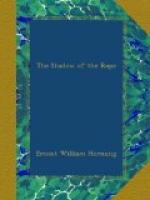“And am I not?” he cried. “Have I denied that the portrait you saw is indeed the portrait of Alexander Minchin? And yet how easy that would have been! It was taken long before you knew him; he must have altered considerably after that. Or I might have known him under another name. But no, I tell you honestly that your first husband was a very dear friend of mine, more years ago than I care to reckon. Did you hear me?” he added, with one of his sudden changes of tone and manner. “A very dear friend, I said, for that he undoubtedly was; but was I going to ask you to marry a very dear friend of the man who deteriorated so terribly, and who treated you so ill?”
Delivered in the most natural manner imaginable, with the quiet confidence of which this man was full, and followed by a smile of conscious yet not unkindly triumph, this argument, like most that fell from his lips upon her ears, was invested with a value out of all proportion to its real worth; and Steel clinched it with one of those homely saws which are not disdained by makers of speeches the wide world over.
“Could you really think,” he added, with one of his rarest and most winning smiles, “that I should be such a fool as to invite you to step out of the frying-pan into the fire?”
Rachel felt for a moment that she would like to say it was exactly what she had done; but even in that moment she perceived that such a statement would have been very far from the truth. And her nature was large enough to refrain from the momentary gratification of a bitter repartee. But he was too clever for her; that she did feel, whatever else he might be; and her only chance was to return to the plain questions with which she had started, demanding answers as plain. Rachel led up to them, however, with one or two of which she already knew the answer, thus preparing for her spring in quite the Old Bailey manner, which she had mastered subconsciously at her trial, and which for once was to profit a prisoner at the bar.
“Yet you don’t any longer deny that you have been to Australia?”
“It is useless. I lived there for years.”
“And you admit that you knew Alexander quite well out there?”
“Most intimately, in the Riverina, some fifteen or twenty years ago; he was on my station as almost everything a gentleman could be, up to overseer; and by that time he was half a son to me, and half a younger brother.”
“But no relation, as a matter of fact?”
“None whatever, but my very familiar friend, as I have already told you.”
“Then why in the world,” Rachel almost thundered, “could you not tell me so in the beginning?”
“That is a question I have already answered.”
“Then I have another. Why so often and so systematically pretend that you never were in Australia at all?”
“That is a question which I implore you not to press!”
The two answers, so like each other in verbal form, were utterly dissimilar in the manner of their utterance. Suddenly, and for the first time in all her knowledge of him, his cynical aplomb had fallen from the man like a garment. One moment he was brazening past deceit with a smiling face; the next, he was in earnest, even he, and that mocking voice vibrated with deep feeling.




